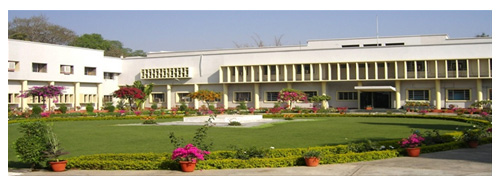 Birbal Sahni Institute of Palaeosciences (BSIP), Lucknow that recorded the shortest average time to process samples among institutions in the country, going beyond its mandate to respond to the COVID 19 crisis, works on understanding the past climate, palaeo-biodiversity, palaeo-environment, past civilizations in order to buttress future environmental projections, plans, and preparations for the climate change.
Birbal Sahni Institute of Palaeosciences (BSIP), Lucknow that recorded the shortest average time to process samples among institutions in the country, going beyond its mandate to respond to the COVID 19 crisis, works on understanding the past climate, palaeo-biodiversity, palaeo-environment, past civilizations in order to buttress future environmental projections, plans, and preparations for the climate change.
BSIP was established in 1946 based on the vision of Prof. Birbal Sahni and the science of Palaeobotany dealing with the study of past plant relics found in sedimentary rocks. The basic idea was to explore and develop palaeobotany as a science in itself, visualizing its potential in solving issues of origin and evolution of plant life, other geological issues, including exploration of fossil fuels. This mandate has been expanded in 2017 to combine it with other science disciplines to address important issues of palaeosciences as a whole and create modern facilities to achieve this end.
The newly widened mandate aims to look at understanding the origin and evolution of life through time, understanding climate change in recent and deep geological times, past civilization and human history and application of palaeosciences to exploration programmes of oil and coal industry.
 The scientists of BISP, an autonomous institute under the Department of Science & Technology (DST), Govt. of India and research personnel with their unique skills are involved in reconstructing past climate, past ecosystems and evolutionary history of 3200 million years ago to (Ma) to ~400 AD. They amalgamate Palaeobotany, Geology, Palaeontology, Geophysics, Geochemistry, and Palaeogenomics under one roof to tackle problems pertaining to palaeoclimate, palaeoenvironment, palaeogeography, palaeoceanography, early human history, evolutionary biology and climate change.
The scientists of BISP, an autonomous institute under the Department of Science & Technology (DST), Govt. of India and research personnel with their unique skills are involved in reconstructing past climate, past ecosystems and evolutionary history of 3200 million years ago to (Ma) to ~400 AD. They amalgamate Palaeobotany, Geology, Palaeontology, Geophysics, Geochemistry, and Palaeogenomics under one roof to tackle problems pertaining to palaeoclimate, palaeoenvironment, palaeogeography, palaeoceanography, early human history, evolutionary biology and climate change.
Monsoons, which significantly impact the socio-economic life in India, are known to fluctuate on several timescales in the past as the instrumental record of monsoon system is rather short. Relatively long term historical and ancient monsoon data is required to model the climate of the future. BSIP scientists are making a concerted effort towards a palaeo-approach to predict the future of the monsoons from data obtained about past records. Besides, cutting edge research on the linkages between the biotic and abiotic factors in various ecosystems and anthropogenic stress on regional and global climate change are being studied by BSIP scientists.
 BSIP practices an integrated and multidisciplinary approach to make Palaeosciences more relevant in the 21st century. This includes researches on a range of broad topical aspects, applied and basic, supported by state of the art instrumentation, computational technology, and well-equipped laboratories with qualified experts. Fusion-science interaction through National and International collaborations as well as different research projects plays an important role in the journey with the new mandate that has been undertaken. The museum of the Institute offers a rich repository of fossils collected from India and received from around the globe. A special attraction is the foundation stone itself, put up in 1949, with 77 fossils inlaid by Prof. Sahni covering the fossils records of the entire Geological scale.
BSIP practices an integrated and multidisciplinary approach to make Palaeosciences more relevant in the 21st century. This includes researches on a range of broad topical aspects, applied and basic, supported by state of the art instrumentation, computational technology, and well-equipped laboratories with qualified experts. Fusion-science interaction through National and International collaborations as well as different research projects plays an important role in the journey with the new mandate that has been undertaken. The museum of the Institute offers a rich repository of fossils collected from India and received from around the globe. A special attraction is the foundation stone itself, put up in 1949, with 77 fossils inlaid by Prof. Sahni covering the fossils records of the entire Geological scale.
The original goal of BSIP had been to develop palaeobotany in all its botanical and geological aspects, to constantly update data for interaction with allied disciplines, to co-ordinate with other palaeobotanical and geological research centres. The journey from here to the fusion with other areas of science to extend this mandate beyond palaeobotany to palaeosciences has been a novel one.






























